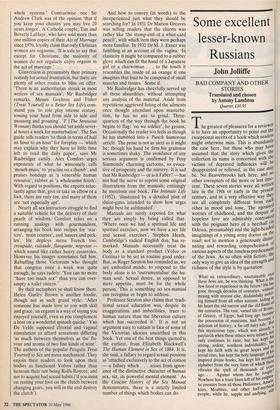Some excellent lesser-known Russians
John Jolliffe
BAD COMPANY AND OTHER STORIES Translated and chosen by Antony Lambton
Quartet, £10.95
The greatest of pleasures for a reviewer is to have an opportunity to point out the exceptional merits of a book which readers might otherwise miss. This is abundantly the case here, but those who may have assumed that the story which gives the collection its name is concerned with the victims of depraved influences will be disappointed or relieved, as the case may be. No Beaverbrooks lurk here, and 110 other corrupters of the more or less inn0- cent. These seven stories were all written late in the 19th or early in the present century, and in a very effective way the are all completely different from act; other in mood and tone. The agoniseu worries of childhood, and the despair °I hopeless love are admirably contrasted with the poignant hero of a beerhall (11_1, Odessa, presumably) and the light-heade° imaginings of a young army doctor on tb.° road; not to mention a generously dlt°111; nating and rewarding comprehension 0! various aspects of the timeless predicament of the Jews. As so often with fiction, the, only way to give an idea of the strength anu richness of the style is by quotation: What an extraordinary, unattainable race these Jews are, he was thinking. What is the Jew fated to experience in the future? He Os. gone through decades of centuries, withon` mixing with anyone else, disdainfully isola.1- ing himself from all other nations,hiding 111 his heart the old sorrow and the old flame ° the centuries. The vast, varied life of Rorie, of Greece, of Egypt, had long ago beconle the possession of museums, had beconie at delirium of history, a far-off fairy-tale. 13° this mysterious type, which was already a, patriarch when these others were infants, n°1,s only continues to exist, but has kept strong, ardent, southern individuality, 17; kept his faith with its great hopes and its kept rites, has kept the holy language of.1ciali inspired divine books, has kept his tnYs13 e alphabet from the very form of which the,r vibrates the spell of thousands of Ye! 1 'tq ago. . . . Against whom has he fon. gua: Nowhere has a trace been left of his enlign,s., tic enemies from all those Philistines, A1".1 kites, Moabites, and other half-1011°,71 people, while he, supple and undying' s- lives on, as though, indeed fulfilling some- one's supernatural prediction. His history is permeated by tragic awe, and is stained throughout by his own blood: centuries of prison, violence, hatred, slavery, torture, the funeral pyre, deportation, the denial of all human rights, — how could he remain alive? How can we know? Perhaps it pleased some Higher Force that the Jews, having lost their own country, should play the role of a perpetual leaven in the gigantic fermentation fo the world.
'Bad Company', by Vladimir Korolenko, is about a lonely, motherless child bravely making contact with an alarming group of down-and-outs living in the vaults of an isolated and ruined chapel, in the lowest depths of persecution and deprivation. The spookiness is perhaps occasionally laid on a bit thick, but the effects would have been far more overdone by Poe or Dickens. As the editor says, the Weird world of a sensitive child is brought to life in a way that `touches and haunts the reader'. It has also inspired an admirably Original and fitting illustration, by Alison MacNeill, on the dust-jacket. To a greater extent even than in the other stories, the general style here is quite unforced, and flows along with a wonderfully natural and unselfconscious strength and freedom, quite without the strained and so often self-defeating search for novelty and far- fetched ingenuity which has plagued so many authors of experimental fiction. The group of four stories by Kuprin is followed by `Lady Macbeth of Mtsensk', by Nikolai Leskov, an unusual figure, even for a Russian novelist, in that he had come under the strong influence of English low church morality through his aunt, a Rus- sian Quaker married to an Englishman under whom he worked for a time as a land agent. This story later gave Shostakovich the theme for his great opera. It is a beautifully modulated account of one pas- sionate crime leading to another, carrying its victims forward on an irresistible torrent of destruction: the primrose way to the everlasting bonfire is traced as inexorably, as convincingly and with as much humanity bY Leskov as by Shakespeare. The collection ends on a less assured note with 'The Abyss' by Leonid Andreev, a drunken and suicidal depressive who was a prey to a variety of morbid obsessions. The story is certainly powerful, and will appeal to those who relish and revel in rgatuitous nightmare terrors and horrors for their own sake, but not perhaps much tO anyone else. With this one exception, these -stories re always highly readable and often deep- ni°ving. They will be unfamiliar to all except serious specialists in Russian litera- ture, and are strongly recommended as a wonderful fresh source of enjoyment. It is teo be hoped that the publishers will be Tleouraged to create a whole library of Tiossian stories, since many of these au- la rs' other works have yet to be trans-



























































 Previous page
Previous page